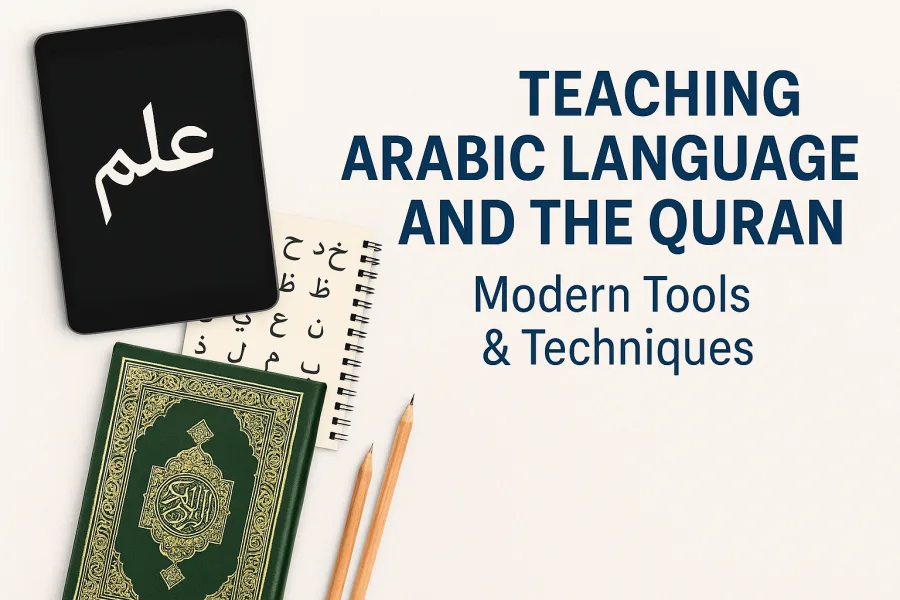Teaching Arabic language and the Quran is so important, beyond only being a means of communication; the Arabic language is essential for comprehending the Quran and Sunnah, which form the basis of Islamic knowledge and are a source of pride for Muslims across the world. For non-Arabic speakers, studying Arabic is essential since it leads to a greater Islamic identity, deeper faith, and proper worship.
Teaching Arabic language and the Quran
Starting with the fundamentals of Quranic Arabic, with an emphasis on the alphabet, proper pronunciation, and high-frequency words and phrases, is the best way for teaching Arabic language and the Quran.
A solid foundation may be established by utilizing Spaced Repetition Systems (SRS), practicing with brief surahs, and incorporating Classical Arabic texts.
Enrolling in organized courses, listening to recitations with translations, and contacting knowledgeable tutors are all advised for thorough learning.
For a thorough comprehension of the content and accuracy of the sacred book, it is essential to learn the Arabic root system and commit words to memory. Ketaby Academy will help you to do that perfectly.
How Can I Read Arabic in the Quran?
The Arabic alphabet (abjad) is where it all starts. Every letter has a distinct sound. Learn about the features of Arabic letters, their distinctive forms, and the sounds they stand for.
The goal of resources such as the Ketaby Academy’s Online Quran course is to educate students on correctly pronouncing the Arabic alphabet using the Noorani Qaida. This makes it possible for our pupils to read any Surah of the Quran effectively at any time. Provide top-notch introductory instruction.
In addition to specific letters, the secret to refining your pronunciation is practice. The cadence of Quranic Arabic is exquisite, with each letter flowing naturally into the one after it. Tajweed is similar to honing your reading skills. It’s a collection of guidelines for pronunciation that guarantee a precise and appealing recitation.
An illustration of this would be the deep throat pronunciation of the letter “ق” (qaf), which is different from the “k” sound.
Try to mimic the subtleties of each sound by immersing yourself in the melodic recitations that are accessible online. The Qur’an is translated and transliterated on websites such as Quran.com, which makes it simpler to follow.
As your confidence grows, start studying the Quran itself. Begin with brief chapters such as Surah Al-Ikhlas (The Purity) or Surah Al-Fatiha (The Opening). If the message is still unclear to you, don’t stress; instead, concentrate on the sounds and the flow.
The advantages of teaching Arabic language and the Quran
Teaching Arabic language and the Quran is regarded as a good and fruitful endeavor that will help people both here on Earth and in the afterlife.
The advantages of teaching Arabic language and the Quran for the learner
- Deepens Spiritual Connection: By understanding the holy word in its original form, learning Arabic enables a direct, nuanced knowledge of the Quran, strengthening one’s relationship with Allah.
- Enhances Worship and Prayer: Being able to comprehend the language of prayer, particularly Surah Al-Fatiha, enables worshipers to be more humble and focused (Khushu).
- Enhances Quranic Recitation: It makes sure the Holy Quran is repeated exactly as it was revealed by facilitating proper pronunciation and Tajweed, or the norms of Quranic recitation.
- Cognitive and Intellectual Benefits: Learning a new language, such as Arabic, helps people become more mentally sharp and enhances their ability to multitask, remember things, and solve problems.
- Knowledge Access: It grants access to a wealth of materials beyond translations by opening up centuries of Islamic research, law, and literature.
The advantages of teaching Arabic language and the Quran for the culture and community
- Enhances Religious Identity: Children’s understanding of their Islamic background is enhanced by Arabic language instruction, which fortifies their dedication and faith.
- Cultural Preservation: It works to protect the Arabic language and its relationship to the rich literary, historical, and philosophical traditions of Arab societies.
- Promotes Unity: By removing cultural barriers, learning Arabic helps Muslims all around the globe comprehend and stand together.
Is the Quran Easy for a Novice to Understand?
No, because Arabic is a classical language and the material is deep, it may be difficult for a total beginner to grasp the Quran in its original Arabic form. Nonetheless, novices might begin to comprehend the Quran with the help of experts at Ketaby Academy, who will help you to do the following:
- Learn the Basics of Arabic Grammar and Vocabulary: It’s important to start with the basics of the Arabic language. This includes being familiar with the alphabet, fundamental grammar, and everyday language.
- Studying Quranic Arabic might be beneficial if you concentrate on the Quran’s vocabulary and grammar. Understanding might be aided by identifying the numerous words and phrases that are repeated throughout the text.
- Use Translations and Tafsir (Exegesis): Tafsir and reliable translations can aid novices in comprehending the context and meanings of the verses.
- Enroll in Arabic classes on the Quran: Structured study and assistance may be obtained by enrolling in classes that focus on teaching Quranic Arabic.
Even novices can begin to understand the meanings of easier passages and progressively increase their comprehension with persistent effort.
Are You All Set to Learn Arabic Online?
Knowing why teaching Arabic language and the Quran is important is only the first step; taking action comes next.
Our Arabic Reading & Language Course at Ketaby Academy is intended for:
Muslims all over the world who want to have a direct relationship with the Qur’an.
New Muslims who need assurance in their recital and prayer.
Islamic science students who want to view Tafseer and Hadith in their original context.
- Individual meetings with accredited Azhar instructors
- Adaptable scheduling
- Two complimentary trial lessons to get you started with assurance
Begin your adventure now: Online Arabic Learning at Ketaby Academy.
Conclusion about teaching Arabic language and the Quran
Arabic is critical for more than just communication. It is a gift from God, the basis for knowledge and unity, and the door to revelation. Scholars from all eras concurred that Islam itself cannot be properly comprehended without Arabic.
In the end, the significance of the Arabic language has been acknowledged throughout history as being crucial to comprehending the core of Islam. So, we care about teaching Arabic language and the Quran.

